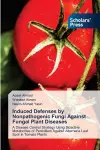
Induced Defenses by Nonpathogenic Fungi Against Fungal Plant Diseases
3 authors - Paperback
£76.68
Mohd Tanveer Alam Khan
Dr. Mohd Tanveer Alam Khan is a Leibniz-DAAD Post-doctoral fellow at Leibniz Institute of Plant Genetics and Crop Plant Research (IPK), Gatersleben, Germany. His main focus of research is mainly on understanding the integrative analysis of low-temperature stress defense responses in Arabidopsis thaliana concerning brassinosteroids signaling and metabolite patterns. He completed his BSc, MSc, and Ph.D. from the Department of Botany, Aligarh Muslim University, Aligarh, India. Before joining the Leibniz Institute of Plant Genetics and Crop Plant Research (IPK), Gatersleben, Germany, he has worked as a post-doctoral fellow at the National Key Laboratory of Crop Genetic Improvement, Huazhong Agricultural University, Wuhan, P.R. China. His area of research is to dissect the abiotic stress tolerance mechanism in plants through engineered signaling, proteomics, metabolomics, and biochemical traits in the presence and absence of phytohormones. During the span of eight and half years as a researcher, he has published more than 21 research articles in the Journal of International repute with the total impact factor of more than 70 and 500 citations along with an h-index of 16 and also contributed 2 book chapter to book edition published by Springer. He has been awarded various research fellowships during his Ph.D. and post Ph.D. tenure such as CST-UP-RA, SERB-NPDF, and international PDF in Huazhong Agricultural University, Wuhan, China, and Leibniz Institute of Plant Genetics and Crop Plant Research (IPK), Gatersleben, Germany.
Mohammad Yusuf
Dr. Mohammad Yusuf is a Lecturer in the Department of Biology, United Arab Emirates University, Al Ain, UAE. Mohammad received his Ph.D. in Plant Physiology and M.Sc. in Botany (Plant Physiology) from Aligarh Muslim University, India. He has worked as the SERB-Young Scientist and also an awardee of the prestigious Dr. D.S. Kothari Postdoctoral Fellowship from the Government of India. He has also been invited to present his work at Huazhong Agricultural University (HAU), Wuhan, China. Mohammad’s research contribution includes more than 50 research articles in the international journal of repute and also more than 2500 google scholar citations with 26 h-index. He is exploring phytohormones mediated abiotic stress tolerance mechanism in crop plants through proline metabolism
Qazi Fariduddin
Qazi Fariduddin is Professor of Botany at Aligarh Muslim University, Aligarh, India where he has been serving as faculty since 2006. He has been extensively working in the field of agricultural biotechnology to explore the abiotic stress tolerance mechanism in plants through physiological and molecular approaches. The findings of his work have revealed that brassinosteroids (BRs) and salicylic acid improved the yield and quality of plants under low temperatures, salt, water, and heavy metal stress and could be exploited as a farmer friendly tool to overcome the menace of crop losses due to various abiotic stresses. Moreover, his findings have also revealed the potential role of hydrogen peroxide and polyamines in conferring tolerance to abiotic stresses in crop plants. His lab is extensively using proteomic approaches to reveal the novel pathway protein expressed under various abiotic stresses in plants. He had Visited Göttingen University, Göttingen, Germany for six months under BOYSCAST Fellowship and conducted experiments related to the topic “Molecular studies of salt tolerance in Arabidopsis thaliana". He has visited Michigan State University, Michigan, the USA on an International Research Project with a specific objective to generate information on "Host target modification as a strategy to counter pathogen hijacking of the jasmonate hormone receptor" (Published in PNAS, 2015). He has published more than 80 research papers in the International Journal of high impact factors such as Proceeding of National Academy of Sciences, USA, Food Chemistry, Plant Physiology and Biochemistry, Chemosphere, Journal of Integrative Plant Biology, Environmental and Experimental Botany, Ecotoxicology, and Environmental Safety, and many more with a total citation of 4925 and h-index of 32. He had presented his findings in various conferences held in the USA, Germany, China, and Malaysia, etc. He has completed various funded research projects from reputed funding agencies. He has also supervised six doctoral students and three MPhil students and several Master's students and presently five students are enrolled under his supervision for Ph.D. degrees.
Aqeel Ahmad
Dr. Aqeel Ahmad is a young and energetic researcher, working in the field of stress physiology. He earned his doctoral degree (Ph.D.) from the University of the Punjab, Lahore, Pakistan, and performed his research work at the University of Florida, USA. Then, he joined Huazhong Agricultural University as a Postdoctoral Fellow, and now he is serving Guangdong Academy of Agricultural Sciences as a Postdoctoral Fellow. He extensively studied plant defense responses (i.e., defense genes, hormones, PR proteins, and biochemicals) against plant pathogens. His core skills are proteomics (profiling, characterization, and supramolecular kinetics) and metabolomics, using which he elucidated cell signaling to understand plant defenses, based on oxidative enzymes of the phenylpropanoid pathway. Transcriptomics further strengthened his scientific findings concerning cell responses towards pathogenic invasions and abiotic stresses. He has devised bioactive metabolites (e.g., benzimidazole and benzene dicarboxylic acid) to control plant pathogens and to augment the nutritional quality of our plant-based foods. He has developed techniques to make edible plants tolerant against environmental stressors by reharmonizing their osmoregulatory systems, oxidative machinery, and physiological responses. He has published 59 research manuscripts in world-renown journals and won three research grants and one research honor award at such a young age of 32 years. A wide spectrum of publication platforms is evident from his scientific articles including the leading journals of Food Chemistry, and Chemosphere, etc. His editorial activities in multiple Impact Factor journals have made him a distinctive and progressive figure in the researchers’ pool.